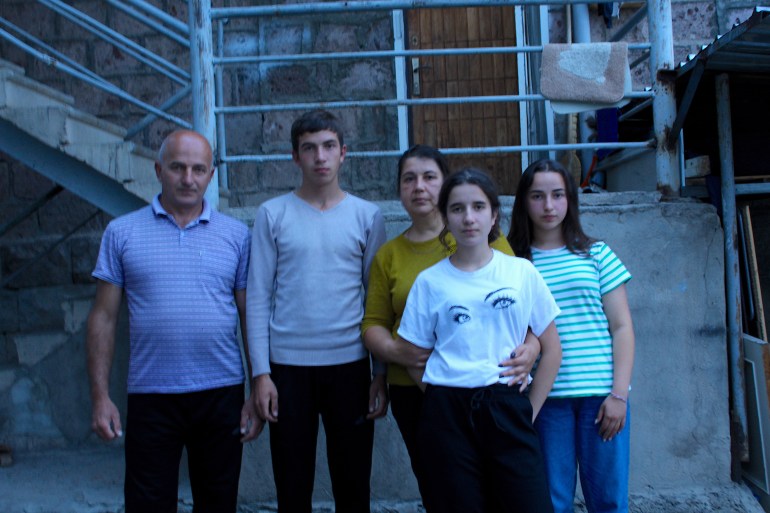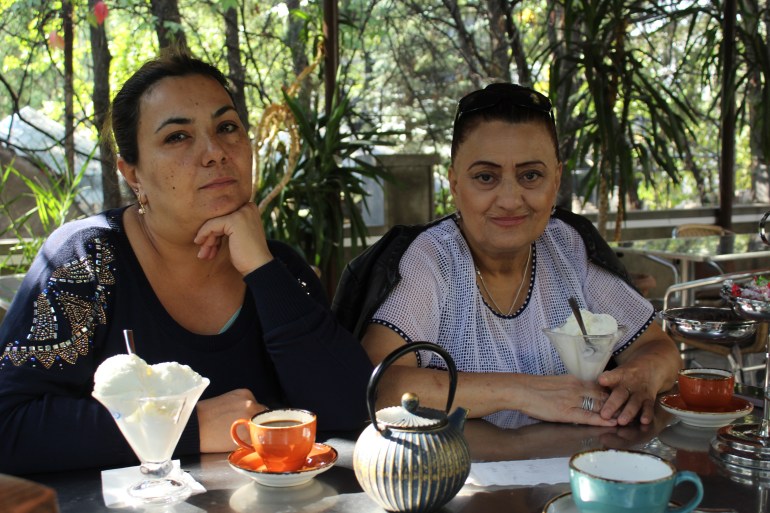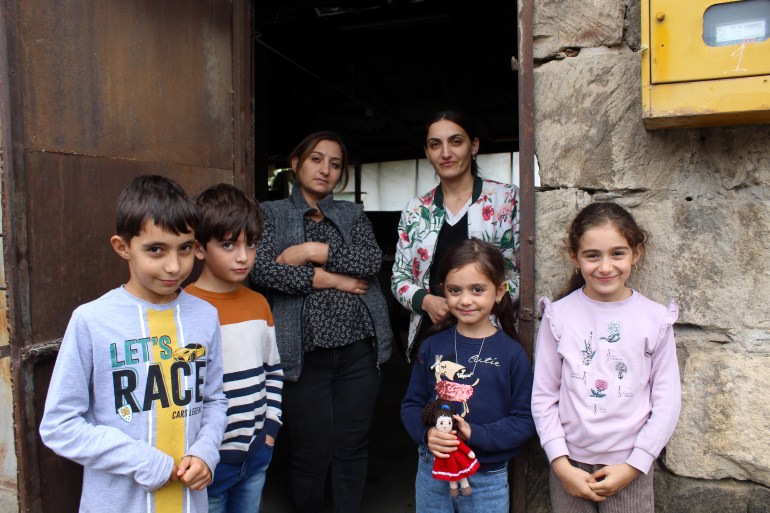Ethnic Armenians who fled Nagorno-Karabakh long for home, decry Azerbaijan
Having fled the long-troubled mountainous enclave, many say they will not return as they bank on more support from Yerevan.

Yerevan, Armenia – Alisa Ghazaryan was full of excitement and nerves as she started her first year at university in Stepanakert, having moved from her village home in Nagorno-Karabakh.
But just as term began, Azerbaijani forces began shelling the city, which Baku knows as Khankendi, on September 19.
Keep reading
list of 4 itemsPhotos: Thousands of ethnic Armenians flee from Nagorno-Karabakh
UN team in Nagorno-Karabakh, a first in 30 years, as ethnic Armenians flee
Khankendi deserted after Azerbaijan defeats Armenian separatists
As they carried out what they cast as an “anti-terrorist operation”, the 18-year-old took shelter in the university’s basement.
“I was born there, I grew up there,” she said of her home. “When I was there, I felt completely free.”

Until recently, Nagorno-Karabakh, a long-troubled mountainous enclave, was home to about 120,000 ethnic Armenians who dominated the region. Since Baku’s lightning offensive, more than 100,000, including Alisa, have fled to Armenia.
Despite assurances by Azerbaijani President Ilham Aliyev to protect their civil rights, many say they feared persecution after years of mutual distrust and open hatred between Azerbaijan and Armenia.
Several displaced people Al Jazeera spoke to in Armenia said they were expecting a massacre.
According to ethnic Armenian officials, at least 200 people were killed in Baku’s assault, including 10 civilians, and more than 400 were wounded.
Baku played down the claims of civilian casualties but acknowledged “collateral damage” was possible.
Azerbaijan, which announced that 192 of its soldiers were killed in the operation, said its blitz was aimed at disarming ethnic Armenian separatists in the region, parts of which now resemble a ghost town.
Al Jazeera was unable to verify either side’s toll.
The assault came after a 10-month blockade, effectively imposed by Azerbaijan after it closed the Lachin corridor to Armenia, preventing the flow of food, fuel and medicine. Baku had accused Armenia of funnelling weapons to separatists through the winding, mountain road, a claim denied by both parties.
The local unrecognised government surrendered after 24 hours of fighting. Aliyev said his “iron fist” restored Azerbaijan’s sovereignty. Late last month, Nagorno-Karabakh’s ethnic Armenian officials said the region will cease to exist as a self-styled breakaway republic on January 1 next year.
‘We are only here to not be on the streets’
Alisa and her family fled through the Lachin corridor, which has since been reopened.
They are staying at a friend’s house outside the Armenian capital, Yerevan. Fourteen people currently live in the cramped space, sharing two rooms.
At night, they sleep side by side on the living room floor.
“We are only here to not be on the streets,” said Alisa.
It’s a far cry from their house in Karabakh, which they had just finished renovating.
The journey to Armenia, which usually takes several hours, took days for some, as people poured out of the region.
The European Parliament this week said the “current situation amounts to ethnic cleansing”.
Those who left are scattered across Armenia, facing an uncertain future and mourning the loss of their homeland.
Nagorno-Karabakh is internationally recognised as Azerbaijan’s territory, including by Armenia. The ex-Soviet rivals have fought two wars over the enclave, in the nineties and in 2020. The first conflict saw ethnic Armenians seize swaths of land, resulting in the displacement of Azerbaijanis, while Baku triumphed in the 2020 war. Since then, Russian peacekeepers have operated in the region, but Armenians blame them for allowing Azerbaijan’s latest attack, which was widely condemned in the West.
Now, there are only a few hundred left in Karabakh, mainly elderly or disabled people.
“The nature was so beautiful. There are mountains and forests. Our home was right on the edge of a forest, we used to walk there a lot,” said Alisa, as she looked at a photo on her phone of a verdant hillside.
Ina, her mother, wanted to throw away the key to their house, but Alisa begged her not to.
“Maybe one day we will go back, maybe when I am an old woman,” Alisa said hopefully.
“Aliyev describes us and our heroes as terrorists, but in reality, he is the terrorist. I want the world to know that Artsakh is our motherland and not [Azerbaijan’s],” she added, using the self-styled name for the region.
Many of those displaced had already fled, in previous wars.

Angela Sazkisjan-Yan, a glamorous 65-year-old, left Baku in 1995.
“Nobody would stay [in Karabakh] because everybody clearly knows the handwriting of Azerbaijan,” she said.
Some people destroyed their furniture or dishes before they left, but Angela cleaned her flat in Stepanakert, and even left the refrigerator on and filled with food, perhaps a symbolic gesture of her hope to one day return.
“Everybody left their property but that’s a small part of it – the worst part is that we left our homeland, our roots. Even my grandparents are buried there,” she told Al Jazeera in Abovyan, northeast of Yerevan.
She is staying with her sister’s family, whom she had not seen in two years.
“I am very happy to rejoin with them because we are an inseparable part of each other, but I have a big soul ache for everything that’s happened,” she said.
Many Armenians living in Nagorno-Karabakh say they were split up from relatives during the blockade.
Lilit Shahverdyan, a 20-year-old freelance journalist, was in Yerevan with her sister during the tensions, while the rest of her family was at their home in Stepanakert.
“We just hugged each other and started to cry,” she said, describing the moment when she finally saw her family, in the border town of Goris, after almost a year apart.
She said the blockade made her family closer and stronger than ever.
“All we have now is just our family and just one apartment in Yerevan. Everything else – not just the property, but all our memories, life goals, and the future was in our homeland – now it’s all gone.”
As her mother locked their front door for the last time in Stepanakert, tears streamed down her face.
“It was the most beautiful house. My father built it 10 years ago. I really enjoyed waking up there every day just going to the garden, hugging my cats or talking to my neighbours. In my childhood, everything was connected to that house.”
Lilit had hoped to return to Stepanakert to work after she finishes her university course in Yerevan. Now, she wants to leave Armenia altogether.
“I’m just afraid that some sh** will happen again. And I don’t want my kids to suffer as much as I did. Armenia is not a safe place as long as we have a neighbouring dictator and we have this government. I don’t want to have another traumatised generation,” she said.

Hopes of a peace deal between Armenia and Azerbaijan seem to be fading after a crucial meeting planned for this week, between Armenian Prime Minister Nikol Pashinyan and Azerbaijani President Ilham Aliyev, was cancelled by Azerbaijan at the last minute.
“It’s not only unrealistic, it’s also a crime to believe that now is the time to collaborate on a peaceful relationship,” said Angela, who said she knows 10 people who were killed in the recent fighting.
“They killed us, how can we live with them in peace?”
Ara Papian, an Armenian lawyer and former diplomat, thinks further aggression by Azerbaijan is possible in the future, particularly in the Syunik region where Azerbaijan wants to build a corridor through Armenian territory to connect with its exclave, Nakhchivan.
Even if a peace treaty is signed, Azerbaijan will “find an excuse and attack”, he predicted.
Papian accused the West of refusing to condemn and sanction Azerbaijan because some nations do not want to get on the wrong side of NATO member Turkey – Azerbaijan’s closest ally.
The European Union’s gas deal with Azerbaijan exposes the bloc’s hypocrisy, he added.
“The EU and the West do not buy oil and gas from dictator [Russian President Vladimir] Putin to not fuel the war in Ukraine, but they buy the same from Azerbaijan knowing that the money will go not to prosperity of people in Azerbaijan, it will become new weapons, which means a new war – which has happened.”
Housing is now the main priority for displaced people, said Margarit Piliposyan, deputy country director for the NGO Fund for Armenia Relief (FAR), which has been distributing food and humanitarian supplies in Vayk, a town south of Yerevan.
The Armenian government recently announced financial support for displaced people with 100,000 dram per person ($239) and then 40,000 dram per month ($96) for six months for housing costs.
However, several people told Al Jazeera they were yet to see any government assistance, such as Lira Arzangulyan, 33, and Alina Khachatryan, 31, two sisters, who fled after the latest escalation.
They moved with their four children and mothers-in-law, to Mrgavan village, in Artashat, a province in the shadow of Mount Ararat, where more than 100 displaced families now live.
They were previously displaced from their home in Martuni after the 2020 war.
The house is small with peeling wallpaper and one gas stove. It is cold inside – even on a mild September day. The owner is letting them stay there for free, for now.
“We don’t have any other place to go so we’re going to stay here. The houses for rent are too expensive, we can’t afford it. We are still uncertain and in shock,” said Alina.
The children play in the other room as their mothers cry softly. Lira’s mascara runs across her cheek as she says how much she misses visiting her mother’s grave in Karabakh.
They both lament the Russian peacekeepers, who Lira described as being “indifferent and doing nothing” to protect or help them.
The first United Nations monitoring mission visited Karabakh on Sunday.
“Why didn’t they come when we had nothing to eat? It is empty now, there is no one living there. If they came before this escalation started and they gave us hope and a guarantee that there is someone to support us, then we would have stayed there,” said Lira.
Their children run in and hug them close.
“I hope this next generation will change and maybe when our kids grow up they will be able to go back there, maybe as a tourist, to see where they’re from,” Alina added.
